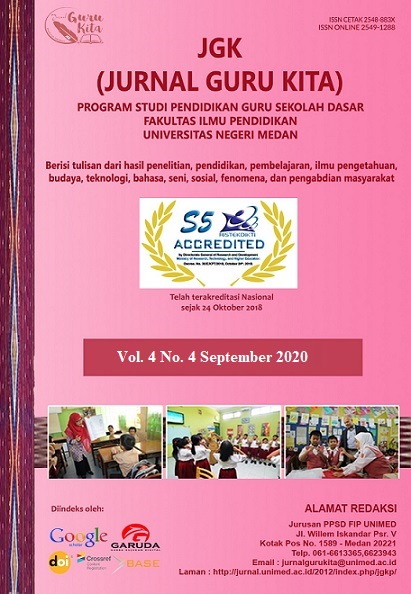PENGARUH MODEL PEMBELAJARAN QUANTUM TEACHING TERHADAP HASIL BELAJAR SISWA KELAS IV DI MIS ISLAMIYAH LONDUT
DOI:
https://doi.org/10.24114/jgk.v6i2.33644Keywords:
Quantum Teaching Learning Model, Science Learning OutcomesAbstract
Abstract: The Effect of Quantum Teaching Learning Model on Learning Outcomes of Class IV Students in Science Subjects at MIS Islamiyah Londut. This study aims to determine 1) Student learning outcomes in the control class using conventional methods in science subjects in class IV MIS Islamiyah Londut 2) Learning outcomes in the experimental class using the quantum teaching learning method in science subjects in class IV MIS Islamiyah Londut 3) The significant effect of the use of the quantum teaching learning model on learning outcomes in science subjects in class IV MIS Islamiyah Londut. The research method used is quantitative research with a quasi-experimental type. The population and sample in the study were 15 students in the experimental class and 15 students in the control class. The data analysis used was t-test and post-test. The data analysis used statistical methods. The data in question is data obtained from the validation results of learning tools and research instruments, as well as research results. Based on the results of data analysis, it can be concluded that science learning outcomes after the implementation of the quantum teaching learning model are better than before the implementation of this learning model, namely the average pretest score of 85.79, while the posttest average value of 85.87. After testing the data obtained a significant value of 0.059 <0.05, in the Pretest and Posttest data so that H0 is accepted and Ha is accepted. It can be concluded from the hypothesis test that the science learning outcomes after the Quantum Taeching learning model is applied are better than the previous model.References
Agus Eko Sujianto, Aplikasi Statistik dengan SPSS 16.0, (Jakarta: PT Prestasi Pustaka,
.
Bobbi DePorter, dkk, Quantum Teaching ,Mempraktekan Quantum Learning Di Ruangruang
Kelas, (Bandung,Mizan Pustaka, 2000).
Hartono, SPSS 16.0, Analisis Data Statistika dan Penelitian, (Yogyakarta: Pustaka), 2008.
Miftahul A™la., Quantum Teaching (Buku Pintar dan Praktis), (Yogyakarta, Diva Press,
.
Rasyid M. Ridho, Wawancara dengan Bapak Kepala Sekolah, 25 September 2021.
Ratna Sri, wawancara dengan guru kelas IV, 25 September 2021.
Rusman, Model-Model Pembelajaran, Jakarta, Raja Grafindo Persada, 2002.
Rusmono, Strategi Pembelajaran dengan Problem Based Learning Itu Perlu untuk
Meningkatkan Profesionalitas Guru, (Bogor: Penerbit Galia Indonesia, 2012).
Shoimin, Model Pembelajaran Inovatif dalam kurikulum 2013, Yogyakarta: Ar-rusz Media,
Samatowa, Usman, Pembelajaran IPA di Sekolah Dasar, Jakarta : Indeks, 2010.
Sugiyono. Metodelogi Penelitian Kuantitatif, Kualitatif Dan R&D. Bandung: Alfabeta, 2008.
Usman Samatoa, Bagaimana Membelajarkan IPA Di Sekolah Dasar. Jakarta: Depatermen.
Pendidikan Nasional Direktorat Jendral Pendidikan tinggi Direktorat Ketenagaan, 2006.
Trianto, Model Pembelajaran Terpadu Konsep, Strategi, dan Implementasinya dalam
Kurikulum Tingkat Satuan Pendidikan (KTSP), Jakarta : Bumi Aksara, 2010
Downloads
Published
How to Cite
Issue
Section
License
Authors published with the JGK (Jurnal Guru Kita) agree to the following terms:
- Authors retain copyright and grant the journal the right of first publication with the work simultaneously licensed under a Creative Commons Attribution License (CC BY-SA 4.0) that allows others to share the work with an acknowledgment of the work's authorship and initial publication in this journal.
- Authors are able to enter into separate, additional contractual arrangements for the non-exclusive distribution of the journal's published version of the work (e.g., post it to an institutional repository or publish it in a book), with an acknowledgment of its initial publication in this journal.
- Authors are permitted and encouraged to post their work online (e.g., in institutional repositories or on their website) prior to and during the submission process, as it can lead to productive exchanges, as well as earlier and greater citation of published work. (See The Effect of Open Access)


























